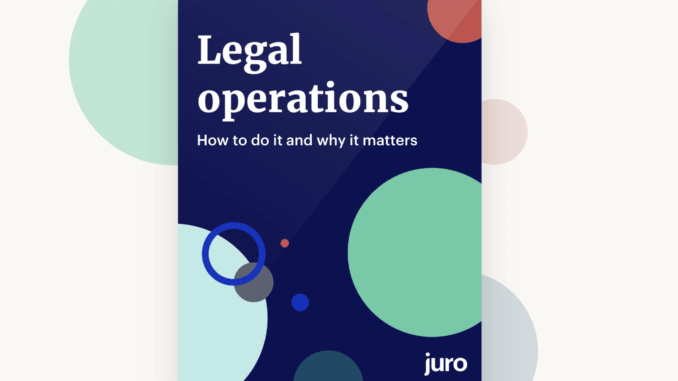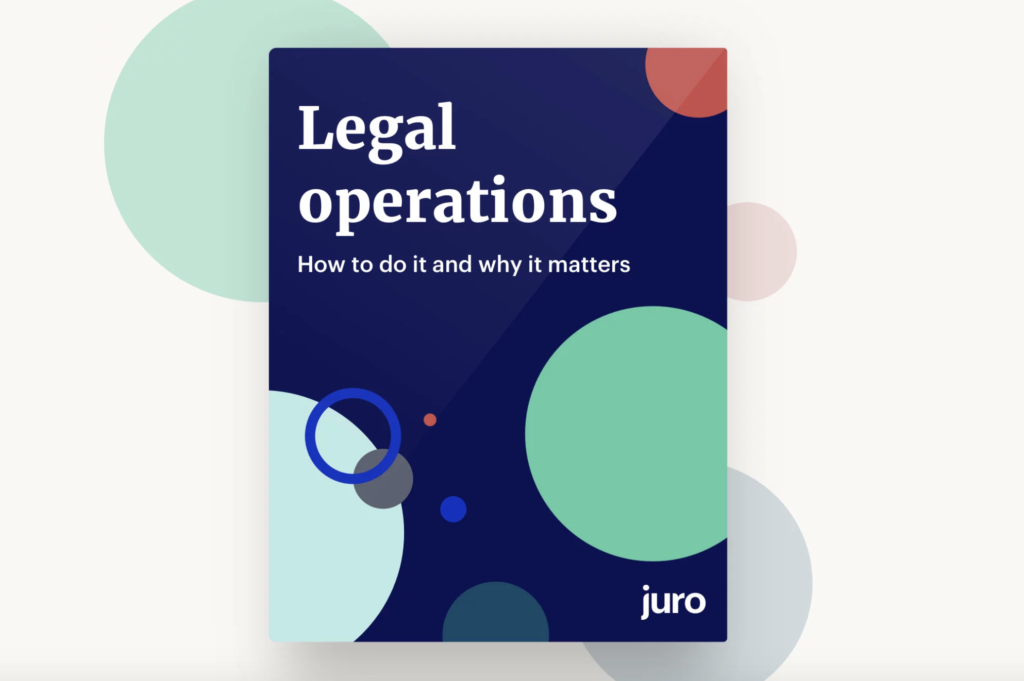
TL, DR: The 14 Key Lessons From Our Legal Operations eBook
By Juro, the end-to-end contract management platform*
The quest for an efficient, effective, modern legal department, run like a business – better known as legal operations – is a defining issue for our customers.
That’s why we wrote an eBook, ‘Legal operations: how to do it and why it matters’ – 13 chapters, 20,000 words, and countless actionable insights for any legal team. It features 14 experts with lessons learned at companies like Microsoft, Monzo and M&S, and it’s free – download it here.
But not everyone has the time for 70 pages of practical insight. Time spent even doing something like hiring another lawyer is hard to justify – that’s one of Monzo GC Dean Nash’s insights from the book. And after all, it’s millennials who’ll change the legal industry beyond all recognition – a demographic not famed for its attention span. So if you don’t have time to read the book, here are the killer lessons from each of our handpicked thought-leaders:
- Financial management: Jameson Monteiro, Head of Legal Operations, Assurant
‘If you pull data for a report and provide numbers to your CLO, who then presents to the CFO, only to find that his or her numbers don’t match, there are few ways to burn legal’s reputation faster. Getting that reconciliation right, on an ongoing basis, is crucial to being seen as a trusted business partner who adds value.’
- Vendor management: Denise Nurse, CEO & Founder, Halebury
‘Each new, disruptive provider makes it harder and harder to explain why you aren’t taking advantage of technology, or ALSP resources, or both, to address low-value high-volume tasks at a sensible price, rather than throwing the same instructions to the same firms for a price that only ever increases.’
- Cross-functional alignment: Mike Russell, Lean Leader, Legal Operations, Ingersoll-Rand
‘For your company’s IT department to dedicate time to legal necessarily means another department is taking a back seat. You need friends in IT who know what you need and why, and why it matters to the business that your project takes precedence – for example, the business impact of a faster contract closing cycle.’
- Technology & process support: Dean Nash, GC & CRO, Monzo
‘It makes sense to align our way of working with the product engineers behind Monzo’s success. They work in small teams, conducting small-scale tests, iterating, prototyping, picking winners and quickly discarding what doesn’t work. Development cycles of one to two months are the norm. To support, enable and react to what they create, we need to work in the same way.’
- Service delivery: Max Hübner, GC & Executive Director of Legal Operations, DPA Professionals
‘Following the legal technology explosion to a software solution that promises efficiency and effectiveness, without taking a hard look at where your legal service map should take you, is amongst the worst mistakes a GC can make. Software alone won’t help you – not without a strategy and a roadmap to guide you.’
To download the full eBook, ‘Legal operations – how to do it and why it matters’ – click here.
- Organisational design: Natalie Salunke, VP Head of Legal, Europe, Fleetcor
Agile working is a step forward for a profession that’s often been too desk-based, but remote ways of working can lead to isolation and disconnection. Even moving to video from voice calls can make a big difference. Those moments of human contact create goodwill that ripples out through your work.’
- Communications: Jason Macarthur, Senior Consultant, Legal Operations and Transformation
‘The key to imparting bad news is to make sure you share pertinent information as early as possible, and as clearly as possible, focusing on facts and their implications. While legal operations is helping lawyers to add value in so many new ways, it’s important not to lose sight of one of the oldest roles a lawyer can play – being the bad cop.’
- Data analytics: Lucy Endel Bassli, Founder, InnoLegal Services
‘Key indicators like contract volume, headcount touched by legal matters, turnaround times – these are headline figures your GC needs to know. It’s important to arm your GC with hard stats for the tough conversations she or he has to have at their level – it’s likely the CFO is grilling them for information, and historically legal hasn’t always been able to provide it.’
- Litigation support: Glenn O’Brien, Former Director of e-Discovery, Liberty Mutual
‘The nature of the data with which we’re concerned has moved on, and it’s no longer good enough to take 21st Century technology, like smart review and data clustering, and dumb it down to give us a paper output to pass around.’
- IP management: Faye Moran, Senior Legal Operations Manager, Marks & Spencer
‘Where could we expand? Where are we vulnerable? Which opportunities to exploit IP might we be missing? IP is one area where legal can directly influence revenue – for example, by protecting IP and facilitating new licensing opportunities. These are the strategic value-adds that could empower lawyers to get a seat at the table, but only if we can find enough efficiency to be able to focus on them.’
- Knowledge management: Leif Frykman, Founder and Chairman, LegalWorks Nordic
‘When you begin to set up your KM system, it’s important to address the structure before rushing into the content. If your department is big enough – and lucky enough – to get a dedicated technical resource, like a web manager, to manage your solution, then you need to think about structure before worrying about content.’
- Information governance: Rohan Paramesh, VP Head of Legal, Habito
‘If we find ourselves running into a funding round, and all our records are immediately accessible, consistent, up-to-date and compliant with internal policy, then a pressing due diligence need can be met with agility and speed. If not, the risk for a startup is obvious – and a small and growing team can’t afford to divert crucial time and resource for a month to fix messy records.’
- Strategic planning: Mick Sheehy, Regional Leader, CLOC Australia
‘In a ‘more with less’ environment, it’s really easy to focus narrowly on productivity. But there’s an obvious question after saving 40,000 hours: what did you do with them? Simply taking them out of the business as headcount reduction would have been a mistake and a terrible disincentive. Instead, by proving our ability to add value, and gaining champions at board level, we had the freedom to take that time and use it wisely: to give a better work/life balance to our team, and to reinvest it in more innovation.’
- Making real change happen in legal operations: Bjarne Tellmann, GC and CLO, Pearson
‘To achieve change and prove success in-house, first, focus on the ‘hardware’: the measurable, identifiable core risks you need to address, and the specialists you need to cover them. Then address the ‘software’; the elements that are harder to measure, like culture, leadership skills, and generational differences. Finally, formulate and roll out your strategy: establish a clear framework that explains the legal department’s purpose and points to where it is headed and how it will manage the change process to get there.’
Of course, if you do have time, download the full eBook here. And if you like what you see, join our legal operations webinar on the 9th of November to find out how to get started at your company – sign up here.
[ * Artificial Lawyer is proud to bring you this Sponsored Thought Leadership article by Juro, the end-to-end contract management platform. ]

1 Trackback / Pingback
Comments are closed.